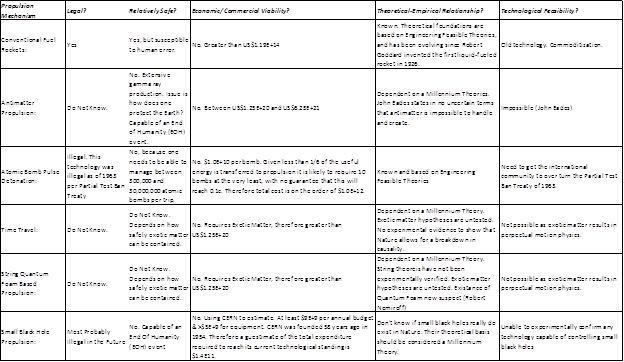To achieve interstellar travel, the Kline Directive instructs us to be bold, to explore what others have not, to seek what others will not, to change what others dare not. To extend the boundaries of our knowledge, to advocate new methods, techniques and research, to sponsor change not status quo, on 5 fronts, Legal Standing, Safety Awareness, Economic Viability, Theoretical-Empirical Relationships, and Technological Feasibility.
In a previous post on Technological Feasibility I had stated that a quick and dirty model shows that we could achieve velocity of light c by 2151 or the late 2150s. See table below.
| Year | Velocity (m/s) | % of c |
| 2200 | 8,419,759,324 | 2808.5% |
| 2152 | 314,296,410 | 104.8% |
| 2150 | 274,057,112 | 91.4% |
| 2125 | 49,443,793 | 16.5% |
| 2118 | 30,610,299 | 10.2% |
| 2111 | 18,950,618 | 6.3% |
| 2100 | 8,920,362 | 3.0% |
| 2075 | 1,609,360 | 0.5% |
| 2050 | 290,351 | 0.1% |
| 2025 | 52,384 | 0.0% |
That is, at the current rate of technological innovation we could as a civilization reach light speed in about 140 years. More importantly we could not even reach anywhere near that within the next 100 years. Our capability would be 6.3% of c.
The Lorentz-Fitzgerald transformation informs us light speed would require an infinite amount of energy (i.e. more than there is in the Universe!), thereby highlighting the weaknesses in these types of technological forecasting methods. But these models still serve a purpose. They provide some guidance as to what is possible and when. The operative word is guidance.
Rephrasing is required. Is the technological light speed horizon of the 2150s too far out? If you are as impatient as I am the answer is ‘yes’. It would not be in the spirit of the Kline Directive to accept a 2150s horizon. 2150s is for people with no imagination, people who have resigned to the inevitable snail’s progress of physics. Further, we now know the inevitable impossibility using our contemporary physics because of the 5 major errors.
Completing the Interstellar Challenge Matrix (ICH) gives:
What are we left with? We have to find new directions, new models, new mathematical constructions, that address all 5 errors. And in the spirit of the Kline Directive, there needs to be a better method of sifting through academic papers “ … to provide reasonability in guidance and correctness in answers to our questions in the sciences …”
What do we do for starters? Here are my initial recommendations are:
1. The physics community has to refocus on mathematical construction hypotheses.
2. More experimental physicist leading combined teams of experimental and theoretical physicist.
3. Prioritize research funding by Engineering Feasible Theories, 100-Year Theories, and only then Millennium Theories.
I started this series of blog posts in order to achieve interstellar travel sooner rather than later, but we as a community are heading in the wrong direction. It won’t work to build bigger carriages. It won’t work add more horses, as some would suggest. That would be like flogging a dead horse. We have to do something radically different. That is why the Kline Directive matters.
I have made the assumption that technological feasibility is a necessary step. Yes it is, given our lack of technological capability to reach the stars in a realistic and finite time frame. Technology feasibility very quickly leads back to the next question of commercial viability, the second step.
Future feasible technologies will iterate between technological feasibility and commercial viability until we can reach the stars in a manner we don’t have to ask the question, whom do we select to leave Earth?
Until then we are not ready!
Previous post in the Kline Directive series.
—————————————————————————————————
Benjamin T Solomon is the author & principal investigator of the 12-year study into the theoretical & technological feasibility of gravitation modification, titled An Introduction to Gravity Modification, to achieve interstellar travel in our lifetimes. For more information visit iSETI LLC, Interstellar Space Exploration Technology Initiative.
Solomon is inviting all serious participants to his LinkedIn Group Interstellar Travel & Gravity Modification.
